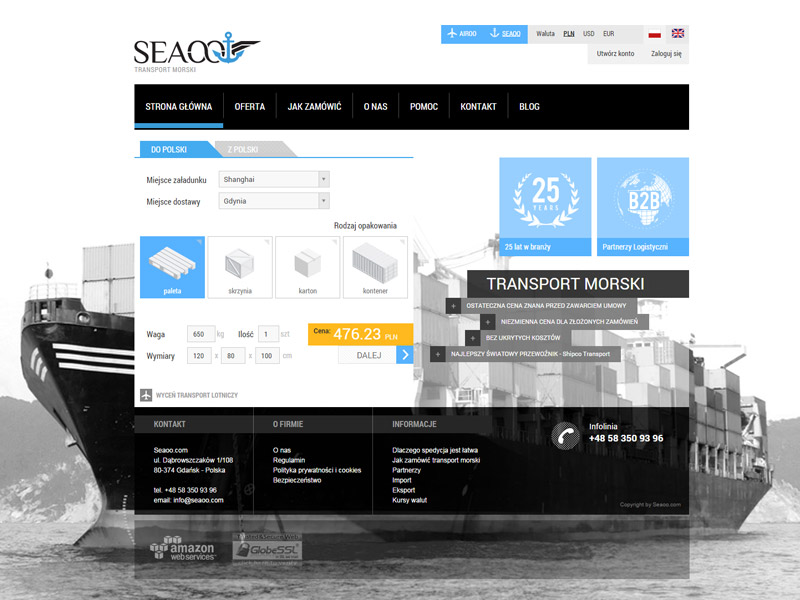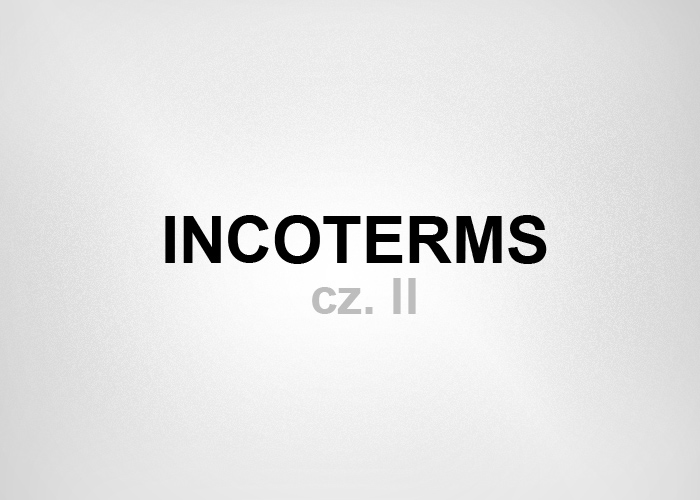The delivery of goods – according to the International Commercial Terms
Well, we have discovered our niche, a fantastic innovative product, we know our sales market, we have found a supplier and we have paid (*) and … what next? You have to import goods to Poland. And here starts the entire wonderful mess.
There is at least a few ways to do this. All determined by a size and value of the shipment and the DELIVERY TERMS according to the Incoterms on which we buy goods from our supplier. This silly abbreviation comprising three letters determines a liability of the shipper and consignee connected with a consignment.
So, let us start from explaining what are these delivery terms.
Encyclopaedically (after Wikipedia): the Incoterms or International Commercial Terms – a series of the international rules, related to common contractual sales practices which are widely used in the commercial transactions all over the world. These terms divide costs and responsibility between a purchaser and a seller and a reflect a nature of the agreed type of transportation. The Incoterms are related to the United Nations Convention on Contracts for the International Sale of Goods. They were published in 1936 and have been periodically updated since then. Incoterms 2010 are a current in force version (from January 1st, 2011), which replaced the Incoterms 2000.
This is enough of a “theory”. In practice, in a commercial contract which should be an integral part of the foreign trade procedure one may negotiate any kind of modifications of the “standard” delivery terms. But for the needs of this study we will use a currently applicable Incoterms 2010.
So, following a Wikipedia – Incoterms 2000:
Group E – Departure – A seller makes the goods available in the specified point of issuing. A seller is not obliged to ensure an export customs clearance, and as well as do not bear costs and a risk of the goods loading. A delivery is assumed as done from a moment in which when goods are left at the disposition of a buyer in the specified place, without obliging to further activities by a seller.
EXW. Ex Works (… named place) – This term places the minimum obligations and involvement on the seller. A delivery is regarded as done at the moment of placing the goods at the buyer’s disposal in the named place, without an obligation to conduct further activities by a seller.
Group F – Main Carriage Unpaid – Group „F..” obliges a seller to make an exports customs clearance. A seller does not bear a basic transport costs and an insurance.
FCA. Free Carrier (… named place) A seller bears the costs of carriage, loading and insurance up to the moment of passing goods to the first carrier, pointed out by a purchaser, in the named place. Goods are assumed as delivered at the moment of loading by a carrier, at this moment a risk of loss and damage to the goods passes to a seller.
FAS. Free Alongside Ship (… named shipping port) – A responsibility for transportation costs and a seller’ s risk end up at the moment of delivering the goods alongside the buyer’s vessel at the named port of shipment, but without loading them on the vessel. From this moment all costs and risks connected with the goods are transferred to a buyer. A term can be used exclusively for the sea or inland waterway transportation.
FOB. Free On Board (… named shipping port) As in the case of the FCA, but a point in which costs and risks for the goods is a moment of entering a board of a buyer’s vessel by the goods, a seller bears also costs of loading. A term can be used exclusively for the sea or inland waterway transport.
Group C – Main Carriage Paid – A seller concludes a shipment contract and bears its costs. A seller is also obliged to make an export clearance of the goods. A risk passes to a buyer at the moment of shipping the goods. All additional, resulting after loading, connected with transport and other event shall be borne by a buyer.
CFR. Cost and Freight (… named destination port) A seller bears no insurance costs associated with the goods which shall be borne by a buyer; a delivery is assumed as realised at the moment of loading the goods to a carrier’s vessel specified by a seller. Besides the CFR abbreviation, one uses also the C&F, CNF.
CIF. Cost, Insurance and Freight (named destination port) In contrast to the CFR, a seller is also responsible for concluding a contract and goods insurance to the benefit of a buyer. It is worth to mention that the Incoterms 2000 impose an obligation to a seller to ensure an insurance protection only in the basic range. Both the CFR and CIF terms can used exclusively for sea or inland waterway transport.
CPT. Carriage Paid To (… named destination port) An equivalent of the CIF term in a transport different from the sea or inland waterway one (including multimodal).
CIP. Carriage and Insurance Paid to (… named destination port) An equivalent of in a transport different from the sea or inland waterway one (including multimodal).
Group D – Arrival – A seller is obliged to deliver the goods to a named place or port of destination.
DAF. Delivered At Frontier (… named place) – A seller is obliged to deliver the goods and place at the disposal of a buyer at the frontier, however before a border of the customs clearance of a given country. In the case of the DAF delivery, costs and risk of unloading the goods shall be borne by a buyer. A seller is obliged to carry out an export customs clearance. A terms refers to the land borders, regardless of the mean of transport.
DES. Delivered Ex Ship (… named port) – The goods are regarded as delivered at the moment of placing them at the disposal (unloading) of a consignee on the vessel at the named port of destination. A seller is to bear all costs up to this moment, and also a risk of loss and damage to the goods during a transport to the port of destination. A seller is obliged to carry out an export customs clearance. Costs and risk associated with unloading shall be borne by a buyer. A term analogical to the DAF, referring to the sea, inland waterway and multimodal transport with a delivery on the vessel at the port of destination.
DEQ. Delivered Ex Quay (… named port) Analogically, as in the case of the DES term, but the goods should be placed at the disposal of a buyer at the quay of the named port of destination. Costs and risks of unloading shall be borne by a seller. A term referring to the sea, inland waterway and multimodal transport, with unloading from the vessel at the port of destination.
DDU. Delivered Duty Unpaid (… named destination place) – The terms of the DDU delivery oblige a seller to deliver the goods to the specified (any) place, also in the country of a consignee, including all costs and risks associated with that, excluding all connected customs costs and a responsibility (carrying out an import customs clearance). The goods are assumed as delivered without unloading from the last mean of transport. A term is applied to all means of transport, however in the case of a place of delivery provided at the port of destination (without further inland transport for which responsible is a seller) should be used the DES or DEQ terms.
DDP. Delivered Duty Paid (… named destination place) – The widest responsibility and a range of activities for a seller among the above mentioned rules. An extended scope of responsibilities when comparing with the DDU term by a responsibility and covering the costs connected with an import customs clearance.
And now changes in the Incoterms 2010 in relations to the Incoterms 2000:
DAT (Delivered at Terminal) – paid customs duty. Delivered at the terminal (a seller is responsible for carrying the goods to the named terminal and their unloading). The DAT replaces an applied up till now the DEQ term. A seller is obliged to deliver the goods at the disposal of a buyer at the frontier, however before a border of the customs clearance of a given country. In the case of the
DAF delivery, costs and risks of unloading are to be borne by a buyer. A seller is obliged to carry out an export customs clearance. A terms refers to the inland frontier, regardless a mean of transport.
DAP (Delivered at Place) – Delivered at the place (a seller is responsible for delivering the goods to the specified place, but their unloading is at the discretion of the buyer). The DAP replaces used up till now the DAF, DES and DDU terms.
As I have mentioned in the introduction, the delivery terms according to the Incoterms or any their modifications (but recorded in the contract) ensure a moderately calm sleeping. The terms should be written in the contract, invoice or in an appropriate declaration of the exporter. Otherwise, the Customs Office of imports will demand establishing them or will apply the EXW terms which in the case of paying transportat costs by an exporter (C and D groups) will cause increasing of the costs in the form of greater value of customs duty and VAT.
Which terms use to the specific types of the consignments soon…




